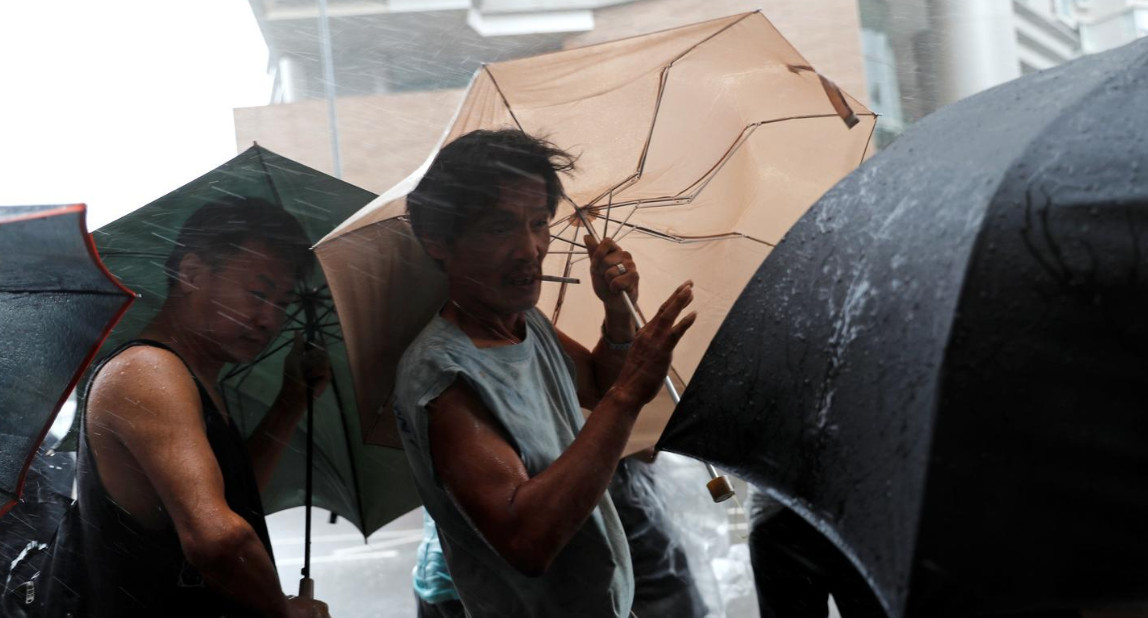Get ready for the typhoon season

It is undeniable that we are deeply affected by global warming.
According to the World Meteorological Organization, 2019 was the second warmest year on record, with the five years from 2015 to 2019 being the five warmest since recording. The Hong Kong Observatory (HKO) also confirmed that May of 2020 was much hotter than usual. The monthly mean temperature of 27.7 degrees in May was 1.8 degrees above the normal figures. Moreover, the annual mean temperature this year is expected to be above normal, very likely to be among the top 10 warmest on record.
Under the effect of global warming, 300 million people’s homes in the world would be lower than the highest sea level by 2050, as predicted by Climate Central, a U.S. non-profit climate science research institute whose estimates was based on the new digital image model of geographic information.
The study points out that Hong Kong, being among the coastal cities with design based on past historical high tide record, may also be flooded at high water levels. The affected areas cover Kam Tin, Hung Shui Kiu, Chek Lap Kok Airport, West Kowloon and Kai Tak. The neighboring areas, namely the Greater Bay Area cities, including Zhongshan, Foshan, Guangzhou, Dongguan, etc., will also be severely affected. These areas are marked in red on the maps in its website, indicating the danger of being submerged.
In addition to the threats of flooding, HKO also predicted that the typhoon season this year may start this month in Hong Kong.
Most people still remember vividly how Hong Kong was hit by the super typhoon Mangkhut two years ago. To better prepare for the potentially serious threats brought about by natural disasters like violent storms and to test the government's response capabilities, the government officers from more than 30 bureaux, departments including Civil Engineering and Development Department, Lands Department and Housing Department (on landslides); Drainage Services Department (on flooding); Highways Department (on major road incidents), etc. and other external parties involved in the handling of natural disasters recently took part in an inter-departmental table-top exercise.
Hong Kong has actually learnt lessons from a history of devastating storms, and has adopted advanced technologies such as geographic information system (GIS) to ensure public safety.
For example, the Geotechnical Engineering Office (GEO) has assumed a leading role in the development and application of three-dimensional debris mobility modelling (3D-DMM) to ensure slope safety. Coupled with advanced modelling, computing technology, and GIS in analysing debris flow path and velocity, the latest 3D-DMM can significantly enhance the accuracy and efficiency of studying and mitigating natural terrain landslide risk. GEO has collected data on more than 60,000 man-made slopes and 2,700 natural hillside catchments in Hong Kong, as well as topographic maps, aerial photographs and LiDAR data to form an effective platform for retrieving spatial and textual datasets. The platform has become an indispensable system for all departmental staff, consultants and engineers. The information is also open to the public, which aims to promote proper maintenance of slopes.
At the same time, to facilitate real-time sharing of emergency information among relevant departments for situation assessment and informed decisions making, an electronic map-based platform Common Operational Picture (COP) has been used. This is also the experience learnt from the super typhoon Mangkhut incidence.
I am glad to see that the government has continued to strengthen its readiness and response to natural disasters, as well as its capability for recovering and restoring work after such disasters. As such, we can truly live up to the status of being a smart city.
-- Contact us at [email protected]
-

Integration of GIS and BIM can drive development of smart city Dr. Winnie Tang
The China Association for Geospatial Industry and Sciences (“the CAGIS”) released the Top Ten Highlights of China's Geographic Information Industry in 2023, which provides much inspiration. The
-

Equip young people for the future Dr. Winnie Tang
In late February, the inaugural flight of an air taxi from Shenzhen Shekou Cruise Homeport to Zhuhai Jiuzhou Port took only 20 minutes with an estimated one-way ticket price of 200 to 300 yuan per
-

Are we raising a generation of leaders, or of followers? Brian YS Wong
The essence of education is defined not by the facts it imparts, but the potential knowledge it inspires students to individually pursue on their own. Put it this way – the ideal form of education
-

The urgent need for reforms to sex education in Hong Kong Sharon Chau
Nearly one in every four university students (23%) in Hong Kong has been sexually harassed, according to a 2019 report published by the Equal Opportunities Commission (EOC). A 2019 study found that
-

STEAM should be linked to real life Dr. Winnie Tang
In the 2017 Policy Address, STEM (science, technology, engineering and mathematics) education was proposed as one of the eight major directions to promote I&T development. Since then, funding has
-
首屆「中華文化節」六月開幕 感受中華傳統文化多元魅力
-
Russia’s nightmare – loss of Far East
-
呈獻精彩絕倫的音樂盛會
-
非凡彩寶之旅 Winston Candy & Winston Kaleidoscope系列
-
My Brief Remarks – at the HKS China Conference
-
The perils of self-censorship
-
中華文化節2024系列~八台戲曲亮相中華文化節 新編粤劇《大鼻子情聖》打響頭鑼
-
DIOR MEN Fall 2024~Effortless Chic流麗衣櫥
-
伊藤詩織:紀錄片是改變的一部分
-
WALTER ALBINI 意大利時裝的無名英雄















